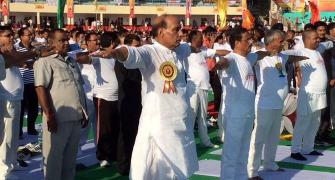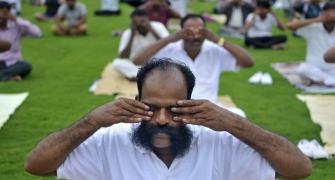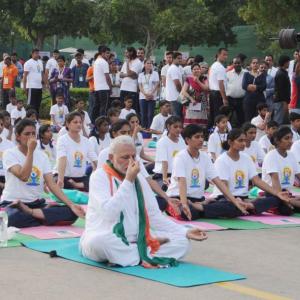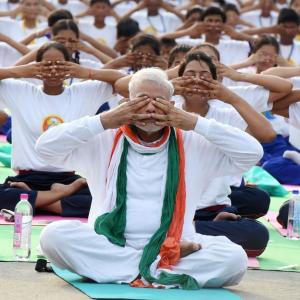
It was almost 10 years ago that the idea of a Yoga Day was mooted by some NGOs, but it had no takers till Prime Minister Narendra Modi realised its potential, probably at the instance of Sri Sri Ravishankar, says Ambassador T P Sreenivasan.
Among the many rabbits that Prime Minister Narendra Modi has produced out of his hat, the one that has multiplied fastest is yoga as part of the Indian smart power, which has the potential to influence the world.
As author Manil Suri has observed in his New York Times column, ‘A practice with Vedic origins that has nevertheless attained such secular popularity is the perfect vehicle to create a shared national consciousness.’ The proposal that such a seemingly innocuous exercise of the body and the mind should be given an International Day by the United Nations was a masterstroke in itself.
There is no automaticity about any Indian idea getting accepted at the UN and, therefore, Modi chose an irresistible concept, which had already been recognised around the world. But it took some efforts by our mission to the UN to find 175 countries to sponsor and to get it adopted without a vote. Though 175 countries co-sponsored the relevant resolution, 16 countries refrained from doing so for one reason or another. Perhaps to ensure wide support, India is not even mentioned in the relevant resolution.
Any proposal to declare a new International Day at the UN meets with resistance because many such Days have been declared already at the instance of various member-States and the secretariat normally maintains that there is a ban on declaring more Days. It was almost 10 years ago that the idea of a Yoga Day was mooted by some NGOs, but it had no takers till Prime Minister Narendra Modi realised its potential, probably at the instance of Sri Sri Ravi Shankar.
Among the Days declared so far, only the most significant ones such as UN Day, Human Rights Day, Women’s Day etc are celebrated and many others are easily forgotten such as the World Toilets Day. Yoga was accepted because the general familiarity it had acquired in the West, particularly at the UN.
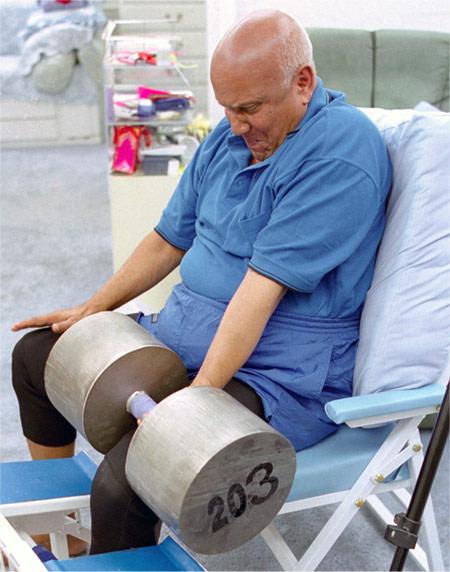
Yoga was introduced to the UN in the early ’seventies by a humble junior clerk in the Indian consulate in New York, who became a yoga and meditation guru of many celebrities in New York, including the then secretary general of the UN, U Thant. With the assumed name of Sri Chinmoy, he himself became a celebrity by the time he passed away in 2007.
Chinmoy established his first meditation centre in Queens, New York, and eventually attracted thousands of students in 60 countries. Since April 1970, he began giving meditation lessons in a room assigned to him. A prolific author, artist, poet, and musician, he advocated, in addition to meditation, athleticism to achieve spiritual enlightenment, including distance running, swimming, and weightlifting.
Towards the evening of his life, he started a project of “lifting” in a special contraption many celebrities, who visited the UN. Among the hundreds he “lifted” were presidents, prime ministers, foreign ministers and ambassadors. Mikhail Gorbachev was one of them. I too had received an invitation to be “lifted”, but I was not too sure that it was safe. Even today, we can see many members of the UN staff coming to work in white kurtas and saris, identifying themselves as the disciples of Sri Chinmoy.
Though there is no record of Sri Chinmoy being remembered in the context of Yoga Day, his views on yoga were very much in tune with the interpretation offered by the Indian representatives. He has said, ‘Yoga does not interfere with any religion. The real aspirant who has launched into spirituality and yoga will find no difficulty in remaining in his own religion. I have disciples who are Catholics, Protestants, Jews and so forth. I tell them not to give up their own religion. It is always easier and safer in the beginning for one to remain in his own religion while he practises yoga. But once he realises God, he transcends all religions. When one goes deep within and realises God, he sees that the whole universe belongs to him, and this realisation transcends all religions. Religion is inspiration. Yoga is aspiration. Divinity is perfection. Inspiration, aspiration and perfection can easily and fruitfully blossom here on earth in transcendental harmony.’
In a letter to Sri Chinmoy in April 1972, U Thant wrote, 'You have indeed instilled in the minds of hundreds of people here the moral and spiritual values which both of us cherish very dearly. I shall always cherish the memorable occasion of our meetings at the United Nations.’
The foundations laid by Sri Chinmoy over a lifetime will now come to India’s help in propagating yoga at the UN. Ban Ki Moon may already know that he is not the first UN secretary general to practice yoga. But the UN itself will move on to celebrate another Day, having done its duty to mental and international peace and, incidentally to a rising India.
In the old days, yoga had its opponents in the east and the west. When we wanted to introduce a series on yoga in the India Magazine, published by the Indian embassy in Moscow, the Soviet government objected to it as anti-Communist. We were told that the spirituality propagated by yoga would promote capitalism. Not wanting to propagate capitalism in the Soviet Union, we finally settled for projecting yoga as a form of exercise sans spirituality! It was only after the Indo-Soviet Treaty that the USSR embraced yoga.
In the US, Christianity found an enemy in yoga and protested against its introduction in schools in New York and California. Many Muslim and Christian nations voted for the Yoga Day for political reasons, but they should not be expected to switch to yoga either as an exercise for the body or the mind.
Yoga is sure to become a fad in the short term both domestically and internationally, but it is not likely to be sustained as a way of life. Prime Minister Modi will find another rabbit soon to bring India and himself on the centre-stage once again. Given the experience of promoting yoga, which is a part of Sanatana Dharma, he will do better to find something more secular.
T P Sreenivasan is a former Ambassador of India and Governor for India at the IAEA; Executive Vice-Chairman, Kerala State Higher Education Council and Director General, Kerala International Centre.
You can read Ambassador Sreenivasan's earlier columns here.

